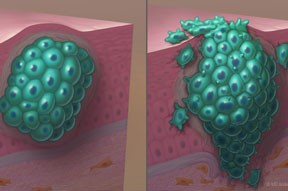Dr. Sisir Das
Neurosurgeon

Introduction
The word "tumor" often invokes fear and anxiety in people's minds, as it is commonly associated with cancer. However, not all tumors are malignant or cancerous. In fact, there is a class of tumors known as "benign tumors" that are much less concerning. In this blog post, we will delve into the world of benign tumors, exploring what they are, how they differ from malignant tumors, and their potential impact on health.

What Is a Benign Tumor?
A benign tumor is a mass of abnormal cells that grow in a controlled and confined manner, typically within a specific organ or tissue. Unlike malignant tumors, benign tumors do not invade nearby tissues or spread to other parts of the body. Instead, they tend to stay localized and are usually encapsulated within a protective sheath. This encapsulation is one of the key distinctions between benign and malignant tumors.
Characteristics of Benign Tumors
-
Slow Growth: Benign tumors tend to grow slowly compared to their malignant counterparts. This slow growth rate is often one of the reasons they are less likely to cause serious health issues.
-
Well-Differentiated Cells: The cells within a benign tumor closely resemble the normal cells of the organ or tissue from which they originated. In contrast, malignant tumors often consist of poorly differentiated or abnormal cells.
-
No Invasion or Metastasis: As mentioned earlier, benign tumors do not invade nearby tissues or spread to other parts of the body. This lack of invasion is a fundamental difference between benign and malignant tumors.
Types of Benign Tumors
Benign tumors can develop in various organs and tissues throughout the body. Some common types of benign tumors include:
-
Adenomas: These are benign tumors that originate in glandular tissues and are often found in the colon, thyroid, or pituitary gland.
-
Fibromas: Fibromas are benign tumors that form in connective tissues, such as muscle or bone.
-
Lipomas: Lipomas are composed of fatty tissue and are typically found just beneath the skin.
-
Meningiomas: These benign tumors develop in the membranes surrounding the brain and spinal cord.
Health Implications
While benign tumors are generally less harmful than malignant tumors, they can still cause health issues depending on their size and location. Large benign tumors can exert pressure on nearby organs, leading to symptoms such as pain, discomfort, or functional impairment. In some cases, surgical removal may be recommended to alleviate these symptoms.
Frequently Asked Questions (FAQ)
Your Questions Answered: Expert Insights by Dr. Sisir Das - Navigating Neurosurgery FAQs with Clarity and Confidence
-
What conditions does Dr. Sisir Das treat as a neurosurgeon?

